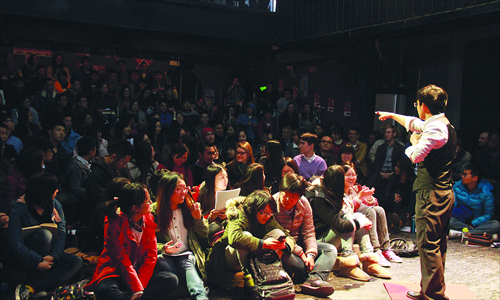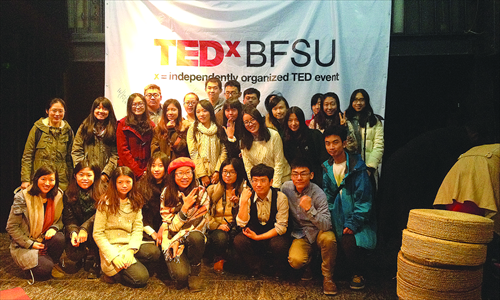The power of ideas

Lin Shen, one of the founders of TEDxBFSU, speaks as the host at their TEDx event on November 16 in Beijing. Photo: Courtesy of Wang Xianya
What could a multi-media journalist, a gay rights advocate, a modern dancer, founder of an environmental education center, and an improv performer/college professor possibly have in common?
The answer is they all shared the stage at a TEDx event hosted by a group of students at Beijing Foreign Studies University (BFSU) on Saturday to tell their stories under the theme "xIdentity."
A TEDx event is an independently organized event licensed by TED, a nonprofit organization that started out in 1984 in the US as a conference. TED, which stands for technology, entertainment and design, is devoted to "ideas worth spreading" and brings together "thinkers and doers" to give talks in under 18 minutes.
In 2009, TED started giving out licenses for local communities to host TED-like events. At the moment, there are over 100 independently organized TED events in China.
It is growing increasingly popular among students driven by the passion for sharing new ideas and the joy of creating an event.
Built on a theme
TEDx events are held according to a theme or a specific community, each of which comes with a set of requirements. In China, many events are based on the university theme.
Anyone can apply on the TED website to organize a TEDx event. Candidates have to submit a detailed proposal about the theme and reason for the event. After attending webinars that explain the rules and requirements, candidates are interviewed via Skype.
The TEDx license is valid for hosting one event under the proposed theme within one year. In most cases, the audience must be under 100 people. TED also has specific rules covering aspects from selecting a speaker to finding sponsors.
Zhu Ling, a senior student at Zhuhai College of Jilin University, received a license in February. Their TEDxJLUZH (initials of the school) is planned for December 7 under the theme "Unnatural."
The idea of the theme is to challenge the things that people take for granted, Zhu explained.
Zhu, 21, said she grew interested in TED after attending TEDx events in neighboring schools a few years ago. The format was new to her, and being exposed to new ideas and meeting a group of young people passionate about organizing TEDx events inspired her.
Lin Shen, 25, co-founded TEDxBFSU with two others. He organized a TEDx event back in 2009. When he returned in 2012 after two years studying abroad, he found that more and more students were joining in but didn't necessarily know the best way to go about it, and decided to help.
"There are many aspects, such as recruiting a team, dividing the team, deciding on a theme and finding speakers, funding, and so on," said Lin, an aspiring entrepreneur.
Over 50 students at BFSU have joined Lin and his friends since July, and were divided into groups with different tasks. The event on November 16 was held off campus, at a small theater in a hutong. Despite a couple of technical glitches, the atmosphere was undoubtedly TED-like.

The TEDxBFSU team and guest speakers at the event. Photo: Xuyang Jingjing/GT
Lack of support
The reason why the BFSU event had to be held off campus was a lack of support from the school, a problem common to many student organizers.
In Chinese universities, student groups are registered under and supervised by the school committee of the Communist Youth League of China. Because of TED's "US heritage," most TEDx groups are not registered as student groups, students say.
"The universities are also sensitive to the fact that this is 'imported' from the US and it's about spreading ideas," said Lin.
In high schools, Lin said, things are surprisingly easier. He helped two top-notch high schools affiliated with universities in Beijing put together TEDx events this year, and the schools were very supportive, providing everything needed for the event.
Apart from a lack of support from school authorities, the "one license, one event, one year" restriction also poses a problem for such groups. In order to attract students to TEDx events, organizers have to find ways to promote themselves on campus, said Li Zengli, curator of TEDxSWUFE, Southwestern University of Finance and Economics in Chengdu. As a result, many TEDx groups work around the restrictions and host lectures or salons on a smaller scale on campus to spread the word among fellow students.
Funding is another big issue. Most of the university events are free, although some bigger events like TEDxNanjing sold tickets to cover costs.
Because the events are small in scale, it's not easy to get sponsors, said Wang Xianya, co-founder of TEDxBFSU who graduated from the university in 2008. She said they wanted to sell T-shirts and other event-related promotion products but were unable to. In the end, they managed to get an overseas study agency to sponsor the event.
Speakers wanted
Many organizers say they don't have the social connections or the appeal to invite the most prominent speakers, whereas TED conferences outside of China attract some of the most prestigious figures from different fields and sell tickets at thousands of dollars a head.
After deciding on a theme, team members put word out on social media to attract candidates or, more commonly, scout candidates online or at other lectures and then approach them. Organizers are used to being rejected or ignored, but Lin said that after they announced the TEDxBFSU event, several of the speakers actually contacted them. Most of those who agree to give a TEDx speech are already familiar with TED and like the concept.
Dave Cooper, an associate professor at Beihang University in Beijing and an improv performer on the side, was one of the speakers at TEDxBFSU. Cooper has spoken at other occasions, but this was his first TEDx event. He says that the minute he heard about the event, he wanted to do it.
"TED is about ideas worth sharing, and you walk away from a TED talk a new person. To be fair it's the same when you walk away from anything but it's a significant change [with TED talks]," he said. "You walk away with a willingness and desire to grow your life in a new way."
While it's unlikely that these students could land a Bill Gates-type speaker for their TEDx event, some took a different approach by inviting ordinary people who have a different story to tell.
Wang Zeyu, 23, follows TEDx events closely. She has just enrolled in a master's program at the Beijing University of Post and Telecommunications, which hosted its own TEDx event in late September. One of the speakers was the founder of a popular student group in the university. Another speaker was a student who took over a dumpling shop off campus that was very popular among students but had to close due to financial difficulties, said Wang.
When she was in Jiangnan University in Wuxi, East China's Jiangsu Province, Wang also joined as a volunteer at the school's TEDx group. Speakers at their TEDx event included students who shared stories on a range of subjects such as volunteering in Nepal.
"I like the spirit of TED and the three elements, and I feel it's more liberating compared with school activities," said Wang.
Pursuit of possibility
A large number of the student TEDx organizers were introduced to the concept not through TED videos, but through other TEDx events near them. Although there isn't a main group that connects all the small TEDx "branches" around the country, TEDx event organizers do meet up in small circles to share their stories and experiences.
Possibility is a word often used by students when asked about the value of TED. "With other lectures, you only hear this particular topic, but with TED, it's open, it opens up your mind, it lets you see more than one possibility and new perspectives," said Zhu Ling from Zhuhai.
As a senior, Zhu said sometimes she feels scared about finding a job and what the future holds. But each time she comes back from a TEDx event, she feels inspired and excited, and that's what compelled her to organize the event.
"You see many things, new things, meet different people, you feel there are countless possibilities in the future, and somehow you don't feel so scared anymore," said Zhu.
Li from TEDxSWUFE is a junior in college. Their TEDx event was held earlier this month. "It's nice to have an event where we can think less about practical matters and about other more idealistic things," said Li, 21, whose courses take up more than 40 hours per week.
These twenty-somethings say they enjoy the process of being involved in something bigger and putting together an event from scratch.
Wang Xianya said she was inspired not only by the speakers, but has benefited much more from the whole process of organizing an event.
"I always thought I was the more relaxed, laid-back type, but when I got involved in TEDx, I suddenly found that I could also do so many different things at once," said Wang.
She said that one of the most important things for her is having met fellow students who share similar values. "We are like a team of entrepreneurs in the process of creating a startup. There was no hierarchy, everybody was equal, and that's the best," she said.
The sentiment is echoed by others. "Not only was I able to communicate with the speakers during the process of preparing for the events, but I also got to know the people around me better," said Li Zengli. "There are so many different ways of thinking out there, and I feel I have also changed in one way or another."